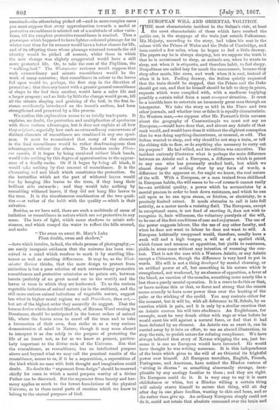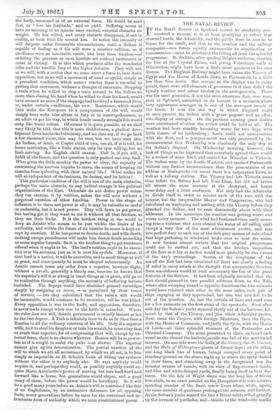EUROPEAN WILL AND ORIENTAL VOLITION.
THE most characteristic incident in the Sultan's visit, at least the most characteristic of those which have reached the public ear, is the stoppage of the train just outside Folkestone. His Majesty, according to the story, had taken his seat in the saloon with the Prince of Wales and the Duke of Cambridge, and been carried a few miles, when he began to feel a little drowsy. The papers say he is always sleeping, but we suppose the truth is that he is accustomed to sleep, as animals are, when he wants to sleep, not when it is etiquette, and therefore habit, to feel sleepy. Neapolitans are called lazy for much the same reason, because they sleep after meals, like cows, and work when it is cool, instead of when it is hot. Feeling drowsy, the Sultan quietly requested that the train should be stopped, that the Prince and the Duke should get out, and that he himself should be left to sleep in peace, requests which were complied with, with a readiness implying possibly a certain relief from a most ennuyant situation. It must be a horrible bore to entertain an immensely great man through an interpreter. We take the story as told in the Times and two other journals, and whether true or false it is equally characteristic. No Western man,—we suppose after Mr. Fawcett's little sarcasm about the geography of Constantinople we must not say no European,—would have done that, and almost any Asiatic of that rank would, and would have done it without the slightest conception that he was doing anything discourteous, or unusual, or odd. The, Sultan wanted to sleep, and why should he not stop a train, or tell the ebbing tide to flow, or do anything else necessary to carry out his purpose? He had willed, and his volition was executive. The incident curiously illustrates what is perhaps the main difference between an Asiatic and a European, a difference which is patent to any one who has personally studied both, but which we almost despair of making clear by any form of words, a difference in the apparent or, for aught we know, the real nature of the will. With a European, or a man trained from childhood in European habits, the will seems to be —of course it cannot really be—an artificial quality, a power which he accumulates by a mental process in order to beat down resistance, and which he can call upon as he can upon steam, or friction, or electricity, to a precisely limited extent. It needs obstacles to call it into full activity, as a motor needs a resisting fluid. The European, except in exceptional cases, is not fond of exerting it, does not wish to recognize it, feels willessness, the voluntary paralysis of the will, to be one of the first conditions of ease and enjoyment. The use of the power suggests labour, like the use of any other faculty, and when he does not want to labour he does not want to will. A European habitually unopposed would, therefore, usually have a weak will and a high temper, a will as of a spoiled child, which fumes and screams at opposition, but yields to resistance, yields in some cases without any intention of resuming the con- test. That is not the case with a Western Asiatic, or any Asiatic except a Chinaman, though the difference is very hard to put in words. His will is not a thing developed by mental churning, or an artifical power at all, but something in his nature which is strengthened, not weakened, by an absence of opposition, a fever of the blood, an emotion of the muscles, something more nearly like a lust than a purely mental operation. It is a crave to do this or that, or leave undone this or that, so fierce and strong that the reason seems scarcely to have more power than over the beating of the pulse or the winking of the eyelid. You may restrain either for the moment, but it will be, with all deference to M. Schulz, by an exertion which is pain, and it is only by a similar exertion that an Asiatic coerces his will into obedience. An Englishman, for example, must be very drunk either with rage or wine before he would exert his will against a natural force, or feel that it had been defeated by an element. An Asiatic can so exert it, can be carried away by it into an effort, to use an absurd illustration, to stop the rain, to punish nature for refusing compliance. We have always believed that story of Xerxes whipping the sea, just be- cause it is one no European would have invented. He would have thought he was writing nonsense. It is this independence of the brain which gives to the will of an Oriental its frightful power over himself. All European travellers, English, French, Portuguese, and American, have noticed the Hindao custom of "sitting in dhurna " as something abnormally strange, inex- plicable by any analogy familiar to them ; and they are right. No European could do it. It is very easy to say it is mere childishness or whim, but a Hindoo willing a certain thing will calmly starve himself to secure that thing, will sit day after day in one place foodless, wasting to skin and bone, and so die rather than give up. An ordinary European simply could not do it, could not retain that absolute command over the brain and
the body, command as of an external force. He would be mad first, or "lose his fortitude," and so yield. Suffering seems to have no meaning to an Asiatic once excited, external obstacles no weight. He has willed, and every obstacle disappears, if not in reality, at least from his mental ken. In action this intensity of will deepens under favourable circumstances, until a Sultan is capable of feeling as if his will were a creative volition, as if obedience were an inevitable result, like heat from friction,—of ordering the greatest or most horrible act without excitement or sense of victory. It is this which produces alike the wonderful calm and the terrible fury of the higher Aaiatics. They will, not as we will, with a notion that we must exert a force to bear down opposition, but as we will a movement of hand or eyelid, simply as a precedent condition, which nature teaches them is essential to getting that movement, without a thought of resistance. Stopping a train when he willed to stop a train seemed to the Sultan no more than closing his hand when he willed to close his hand, would have seemed no more if the stoppage had involved a thousand lives, -or, under certain conditions, his own. Resistance, which would have woke the European to a compression of the will, would simply have woke him either to fury or to unscrupulousness, to an effort to get his way, in which bonds usually strongly felt would snap like burnt cotton. Of course it is quite possible, as we shall very likely be told, that this is mere childishness, a gradual deve- lopment from unchecked obstinacy, and we dare say, if we go back a few thousand years, this may be true, but we have seen this. An Indian, or Arab, or Coptic child of two, can sit, if it is told, for hours motionless, like a little statue, only its eyes rolling, but no limb moving. An English child cannot. Call it, if you will, a habit of obedience, and the question is only pushed one step back. What gives the little monkey the power to obey, the capacity of restraining the nervous impulse to move, the means of keeping its muscles from quivering with their natural life ? What makes its will so independent of its instincts, its desires, and its habits?
This particular condition of the will is one of the main obstacles, perhaps the main obstacle, to any radical change in the political -organizations of the East. Orientals do not desire power unless they can exercise it by volition, unless the will acts without a perpetual exertion of other faculties. Power in the shape of influence is to them not power at all; it may be valuable or useful or endurable, but it is not power. They will fawn to get power, but having got it they want to use it without all that friction, as they use their limbs. It is the hardest thing in the world to keep an Asiatic who means to be just within the limits of his authority, and within the forms of its exercise he never is kept ex- cept by coercion. If he has power to decree death, and wills death, nothing except punishment will make him decree death according to some regular formula. So it is the hardest thing to get resistance offered when it ought to be. The lord's volition ought to be execu- tive over his servants, just as it is over his eyelids. Moreover, if that lord is a native, it will be executive, and in small things as well as great, and consequently he must be obeyed subserviently. An Asiatic cannot resist any order from a superior, however slight, 'without a revolt, generally a bloody one, because he knows that his superior's will is as strong in small things as in great, will go on to realization through anything, the necessity of inflicting torture included. The Sepoys could have abolished greased cartridges simply by resigning en masse, — as permitted by their terms of service, — but they calculated that the ruler's will would be inexorable, would continue to be executive, till he was killed. Every opposition is war to the knife, and opposition, therefore, is never made except when war to the knife is intended. Where the ruler does not will, Asiatic government is usually lenient or lax to the last degree. A Turk is infinitely freer to do as he likes than a Russian in all the ordinary concerns of his life. Only if a superior -wills, be it to steal his daughter or take his wealth, he must obey that or crush that superior, for of compressing that will, except by ex- ternal force, there is no chance whatever. Reason will be as power- less as if it sought to make the pulse beat slower. The superior cannot give up his determination. The partial exertion of the will to which we are all accustomed, by which we all act, is to him simply as impossible as M. Schulz's habit of lifting one eyebrow without the other is to anybody else. He says anybody could " acquire it, and perhaps they could, as possibly anybody could ac- quire Marie Antoinette's power of moving her ears backward and forward like a horse, but generations would elapse, and a good many of them, before the power would be hereditary. So it will be a good many years before an Asiatic's will is restrained like that of an Englishman, by an instinctive deference for all opposing facts, many generations before he cares for the restrained and in- _fractuous form of authority which we term constitutional power.































 Previous page
Previous page